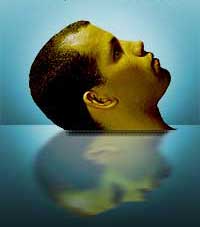Two Truths in Buddhism
by Professor N. A. de S. Amaratunga, The Island, Sept 9, 2008
Kandy, Sri Lanka -- Theravada Buddhism had described two Truths; Absolute Truth (Paramatha Sathya) and Conventional Truth (Sammuti Sathya). Nagarjuna Thera of the Mahayana Tradition also identified two truths, but his theory was different from that of Theravada Buddhism.
 Are there, in fact, two types of Truth in Theravada Buddhism? Do these two Truths vary in degree? Is Absolute Truth superior in anyway to the Conventional Truth? Some Buddhists commit the mistake that Absolute Truth is superior to the Conventional Truth and some go to the extent of saying that Nirvana is the Absolute Truth.
Are there, in fact, two types of Truth in Theravada Buddhism? Do these two Truths vary in degree? Is Absolute Truth superior in anyway to the Conventional Truth? Some Buddhists commit the mistake that Absolute Truth is superior to the Conventional Truth and some go to the extent of saying that Nirvana is the Absolute Truth.
On the basis of this premise, they arrive at new interpretations of Nirvana, which could be misleading. In fact, there is only one Truth in Buddhism, but there are two ways of presenting it. This will be explained briefly.
Buddha and also the Abhidhamic theorists who based their discussions on the Buddha’s preaching have categorically said that the Absolute Truth is not superior to the Conventional Truth and that there is no difference in degree between the two. More importantly, either of these two Truths could be made use of to gain insight and follow the path to Enlightenment. Buddha had used both in his preaching depending on the intellectual ability of the listener.
What then was the reason for identifying two Truths? In early Buddhist preaching, all phenomena of human existence, both mental and physical, had been analyzed according to five methods.
In the first method, they were analyzed into "nama" (mind) and "rupa" (matter), in the second into five aggregates (rupa [matter], vedana [feelings], sanna [perception], sankara [mental formations]and vinnana [consciousness]), in the third into six elements (earth, water, temperature, air, space, and consciousness), in the fourth into twelve avenues of sense perception and mental formation and in the fifth into eighteen "dhatus".
These derivatives were considered as the elements of all phenomena of human existence. When a particular phenomenon was explained in terms of these elements, the explanation was considered as the Absolute Truth. When the same phenomenon was explained in terms of general agreement it was considered as the Conventional Truth.
Later Abhidhamic theorists had recognized the need to analyze further the above mentioned elements and they arrived at irreducible ultimate factors, which were called Dhammas, a comprehensive list of which appears in the Abhidhamma Pitakaya.
These Dhammas it is said, participate in the process of dependent co-origination. Though they are recognized as ultimate elements for purposes of understanding, they are not separate entities and each occurs in conjunction with several other Dhammas. Their occurrence is dependent on conditions and once created they too can act as conditions for the occurrence of others.
All mental experiences and physical phenomena occur in this manner. An explanation of a phenomenon, mental or material, in terms of these Dhammas is said to be the Absolute Truth. When the same phenomenon is explained in terms of general agreement, that explanation is said to be the Conventional Truth. If for example, a human being is explained in terms of the five "skandhas", it is considered an Absolute Truth. On the other hand, if a human being is explained as a person who will goes through life and suffer and finally die in a process of endless "samsara", then it will be a Conventional Truth.
These definitions, however, do not mean there are two types of Truth in Theravada Buddhism, but rather two ways of presenting the Truth.
As mentioned earlier either could be made use of, as two ways of arriving at the path to Enlightenment. Thus there is only one Truth in Theravada Buddhism.

 Are there, in fact, two types of Truth in Theravada Buddhism? Do these two Truths vary in degree? Is Absolute Truth superior in anyway to the Conventional Truth? Some Buddhists commit the mistake that Absolute Truth is superior to the Conventional Truth and some go to the extent of saying that Nirvana is the Absolute Truth.
Are there, in fact, two types of Truth in Theravada Buddhism? Do these two Truths vary in degree? Is Absolute Truth superior in anyway to the Conventional Truth? Some Buddhists commit the mistake that Absolute Truth is superior to the Conventional Truth and some go to the extent of saying that Nirvana is the Absolute Truth.